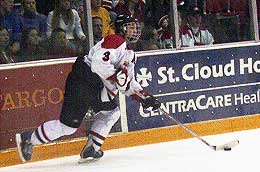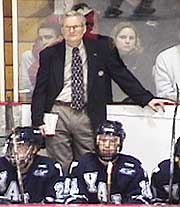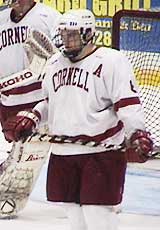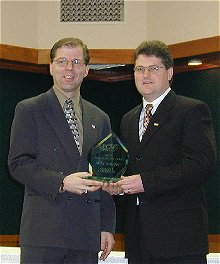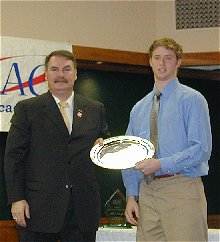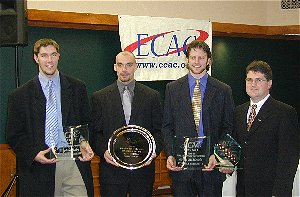Super, Really
Yes, I was a skeptic. Yes, I was vocal about it.
While I still maintain that the regular-season was a less-than-thrilling ride, having six teams in the CCHA Championship Tournament has already heightened the level of excitement surrounding the weekend, and the pairings — and potential pairings — should provide outstanding hockey for fans.
The coaches, too, seem excited not just to have made the tourney, but about the format itself.
“I think a new Super Six idea has got a lot of good publicity, and I think it’s a good development within our league,” says Ron Mason. “Of all the years we’ve been there, this may be the most competitive field by far, even when there were only four teams there.”
Says Red Berenson, “This is not a format that I was in favor of, but I think the league has done a great job of promoting it. I hope the crowds are great at Joe Louis, because all the teams are playing their best hockey at this time of year.”
Like me, Berenson thought that having every team in the league make the playoffs would diminish some of the distinction of, well, making the playoffs. “If you’re playing the 28-game format, you should be playing to gain more than home ice. On the other hand, I can see the advantage to seeing six teams go to Joe Louis.”
Parity, For Real
Leave it to Rick Comley — a man of few words during the regular season — to accurately and elegantly sum up this season of CCHA parity.
“It’s been a really interesting year, tight, competitive. I felt five or six years ago that it was just critical for the league for everybody to step up and play with Michigan and Michigan State, that it’s better for everybody — except for Michigan and Michigan State.”
With two first-round upsets in six series — and two series needing three games to decide a winner — there is no question that the league has finally achieved the parity it desires.
(Writer’s note: the word parity does not imply judgment, either way. Teams from top to bottom in the CCHA could be equally good — or equally mediocre. Only the NCAA tourney will determine the nature of this year’s parity.)
The one thing that the league feared most with its new playoff format was realized last weekend in Ann Arbor: the No. 1 seed lost a game to the No. 12 seed, and took a huge hit the Pairwise, moving Michigan from “sure thing” NCAA status to “bubble.”
“Finishing in first place was not a reward when you had to play the last-place team,” says Berenson. “Lake Superior played very well, and certainly distinguished themselves. If there’s any sign of parity [in the league], that was it.”
Perhaps this serves as a reminder to be careful what you wish for.
All-Conference Team Selections
There has been some noise made about the CCHA’s All-Conference selections, especially since no one from Northern Michigan — the third-place finisher in regular-season play — was selected for either the First or Second All-CCHA teams.
Comley says that the length and nature of the college hockey season affects how coaches vote for All-Conference teams. “You may play a team early, [and] a player has to play very well in that series or they [coaches] forget about him. It doesn’t diminish Chad Theuer or Craig Kowalski and the year they have.”
Berenson would like to see a change in the way the voting is handles. “I think the timing of the voting could be improved. I think it would be good if we had another day or two after the league series to vote.”
Dave Poulin says that Connor Dunlop and David Inman were a little “put out” by being the first two Honorable Mention picks, essentially the seventh and eighth players among forwards in voting. “They take a lot of pride in it without a question. There are a lot of good players in this league.”
Speaking Of Pairwise …
Many people wrote in, wondering how Michigan could have dropped so dramatically after losing to Lake Superior State. What most people don’t people understand is that what Michigan itself does is not the only factor in the Pairwise rankings. Much depends on what other teams do as well.
Last weekend, the only upsets in the first round of playoff action came in the CCHA. That means that everyone near or around Michigan in the Pairwise won; Michigan didn’t. This has an effect on where Michigan is ranked.
In fact, under the right mix of wins by favorites and top seeds this weekend, Cornell will vault to fourth in the Pairwise, something nearly unthinkable weeks ago.
Among the Super Six, Michigan State will undoubtedly receive an NCAA berth, and Michigan looks likely to. Of course, the playoff champion — whoever that is — receives an automatic bid.
As for the rest of the Super Six field, Notre Dame and Ohio State would have to win the tourney outright to be invited to the big dance. Alaska-Fairbanks (11th) and Northern Michigan (12th) are bubble teams, and Rick Comley is taking nothing for granted. “We might have to win two just to get in.”
Comley says, “The system is the system. This is what the coaches wanted; it’s based 100 percent on the ice. What you don’t know and what you can’t assess is that other people are playing other people, and you won’t know until the final RPI or Pairwise come out.”
Now you know.
Quarterfinal Byes
Both Michigan and Michigan State are sitting the Super Six Quarterfinals out. As the No. 1 seed this weekend, the Wolverines will play the lowest seed to advance past Friday in the 5:30 p.m. game Saturday. Michigan State will play the other team at 2:00 p.m. Saturday.
What is there to say about either of the bye teams that hasn’t already been said this season? Both can be explosive offensively; both play good defense. The Spartans have an ace in net, and Michigan’s Blackburn is no slouch.
“I think at this time of year you’re more concerned about your own team, making sure you’ve got your game in order,” says Mason. “At least we’ve played everybody, so it’s not like you’re going to play somebody that you haven’t seen like in the NCAA tournament.”
“We respect the fact that we can play any three of the four teams that are playing Friday,” says Berenson. “I can’t tell you that the bye is the big advantage. On paper, it’s supposed to be an advantage. We’ll have to see how it works out.”
One advantage that Michigan has is Mike Cammalleri, who returned to form in spectacular fashion against Lake Superior State, notching a hat trick in the Saturday game and two goals Sunday.
Berenson says, “He scored five goals this weekend, played three games in three nights, and looked to be as good as ever.”
Postscript, Part I
This CCHA Championship Tournament marks the first time that Nebraska-Omaha has missed a trip to Detroit since becoming a member of the league, having lost two games in the Bullpen to Notre Dame last weekend. Says head coach Mike Kemp, it isn’t easy.
“It was a hell of a series. We just didn’t score. We outshot them three nights but didn’t score. We had a lot of opportunities, but our problem the whole second half has been finishing.”
While losing is never something a coach enjoys, sitting this one out is particularly difficult. “I think our expectations going into the year were higher than what we were able to accomplish, and that’s a disappointment,” says Kemp.
He feels it most keenly for the UNO seniors, who really were pioneers for the program. “They came in and the first half of their freshmen year we went two and seventeen. Since then, those guys are like seventy-two and fifty-something. They’ve really been a bunch great players.”
Don’t think that Kemp is on the list for the Wisconsin job. He isn’t. He’s not going to leave UNO.
“I came here to start this program, and I’ve had some pretty high goals that I have yet to accomplish.”
There’s another reason that Kemp won’t be leaving Omaha — two reasons, in fact.
“Coaching to me is a career, an occupation. I have two daughters, and they’ve adjusted to living in this community.” Kemp’s oldest daughter is starting high school, and he doesn’t want to disrupt his family life.
There are other great reasons to stay in Omaha, but the real reason for Kemp staying is absolutely the best.
Postscript, Part II
Bowling Green has had real success in CCHA postseason play under the guidance of head coach Buddy Powers, even when the Falcons were having a less-than-spectacular during the regular campaign.
Last year, BG beat Miami on the road to advance to the now-defunct play-in game, where the Falcons beat the Wildcats in Marquette.
Last weekend, Bowling Green nearly pulled off an upset in East Lansing, going up 3-0 before losing to the Spartans 4-3, in overtime.
“We let them off the hook,” says Powers. “That’s the bottom line. We didn’t make many mistakes in the game, played about as good as we could. Their big dogs stepped up.
“Really, the series with MSU was a microcosm of our whole season. You’re going to be in close games, and the teams that have the guys who can step up are the ones who are going to win the game.”
Earlier this week, Bowling Green announced that Powers will not be returning as head coach next season, a fate I don’t think he deserves, but that’s just one woman’s opinion.
As Kemp reminds us, this is more about winning or losing. Coaching is an occupation, and losing his job will affect not only his family, but very likely the families of many people who work with him.
Everyone in hockey hates to see something like this happen to anyone, but especially to someone as well-liked as Buddy Powers. He’s a great guy, and he’s always been a straight shooter with me. In fact, early in my career, Powers was very encouraging and patient, and for that I’ll always be grateful.
Quarterfinals Preview
This Girl Reporter isn’t going to attempt to preview every possible Super Six permutation, so here are previews of the two Quarterfinal matches. These two games should give college hockey fans everything they crave — competition, excitement, and maybe even a little drama.
No. 6 Notre Dame (16-16-5) vs. No. 3 Northern Michigan (25-11-2), 4:00 p.m.
What a shame that the game with arguably the best potential for going into triple overtime is the early Friday game, traditionally the worst attended.
During the regular season, these clustermates were dead even, splitting four games 2-2-0, with each team winning one in the other’s barn.
“I have a tremendous respect for Rick Comley and what he has done for that program,” says Notre Dame head coach Dave Poulin of NMU’s head coach.
Says Comley, “I’m excited to play Notre Dame. I return the respect to Dave.”
Okay. So we’ve established the Mutual Admiration Society.
The teams have more in common than coaches who are genuine class acts. Notre Dame returns to The Joe for its second appearance in three years; Northern Michigan’s last appearance in the CCHA Championship tourney was at the end of the 1998-99 season.
To get here, Notre Dame had to win in the ultra-tough Bullpen of Nebraska-Omaha, a place where the home team hadn’t seen a postseason loss, ever. Although the Wildcats had a home-ice advantage in the first round, NMU had to break a postseason, first-round curse. In 1999-2000, NMU lost its home best-of-three, first-round series to UNO in three games; last year, after needing three games to beat Western Michigan at home in the first round, the Wildcats lost the now-defunct CCHA play-in game — at home — to Bowling Green.
Poulin said that after losing the first game to UNO last weekend, it wasn’t just bouncing back the second night that helped propel the Irish to Detroit, but it was the way in which his team did so that made the difference the third night. “On the second night, the seniors really raised their level of play. In games like that, you need your big guys to lead, and they did.”
Another key to the road wins in the first round was defense — something that the Irish worked on down the stretch. After posting a disappointing 2-5-1 record in January, Notre Dame went 5-3-0 in the eight games prior to the playoffs.
“The big thing in our late-season play is that team defense is much, much better. Morgan Cey is a large part of team defense for us.
“We really focused on the start of the year on offense because we hadn’t been a high-scoring team. While the offense started to come, after a period of time the defense started to pay the price. It got to a certain point where the improving offense had diminishing returns.”
A quick look at the boxes from the UNO series reveals that Notre Dame’s return to defensive play paid off; in the series, the Irish blueliners contributed three goals and an assist.
For the Wildcats, 2002 has been — if not perfect — pretty darned good. NMU has gone 14-5-1 since the beginning of the new year, and the Wildcats showed their characteristic grit and tenacity just before the start of the year, when they beat both Cornell and Maine in the Florida Everblades’ holiday tournament. Take that holiday tourney out of the equation, and NMU was a .500 team in November and December.
“We went through a stretch there that we played without [Chris] Gobert, [Bryce] Cockburn, and [Terry] Harrison,” says Comley. “[Taking] three of our top scorers out made it almost impossible to win games.”
Both the Irish and the Wildcats seem to have hit their stride at the right time, an admirable quality for a hockey team. Here’s the match-up, by the numbers. All statistics are from overall play.
Comley says that the evenness of this series has little to do with specific players from each team matching well. “I just think the two teams match with each other in overall talent. I just think they’re two very even teams.”
Adds Poulin, “Goaltending certainly was a factor in all four [regular-season ]games. Special team will be a huge factor as well.”
Last weekend, the Wildcats dispensed with the Miami RedHawks without seemingly having to break a sweat, but the Irish escaped Omaha by the width of one puck. Goaltending may indeed be the factor in this game. Young Morgan Cey has the goods, but so does Craig Kowalski — when he’s on. Kowalski is a streaky netminder who appears unstoppable sometimes, utterly beatable others. But when he’s unstoppable — holy moly.
Northern is deeper up front, and the Cockburn-Theuer connection is pure poetry. But Notre Dame has talent as well, and David Inman is having an inspired season.
If Notre Dame plays its patient, defense-minded game, there could be an upset here. During the CCHA’s Super Six coaches teleconference, Comley said that when NMU was a member of the WCHA, the four or five seed had never won the championship.
If Comley weren’t one of the nicest guys around, I’d say that statement sounded a bit like a gauntlet, thrown.
No. 5 Ohio State (19-15-4) vs. No. 4 Alaska-Fairbanks (22-11-3), 7:30 p.m.
Although the Buckeyes come in the fifth seed, there’s no denying OSU is a far bigger underdog than is No. 6 Notre Dame. Not only did Alaska-Fairbanks positively take it to Ohio State just a few weeks ago — winning 6-3 and 6-1 in Fairbanks — but everyone seems to be rooting for the Nanooks.
If ever a playoff series presented a grudge match and a Cinderella story rolled into one, this is it. The Buckeyes have lost three of their last four games against the Nanooks, having dropped an overtime home decision to UAF last season in addition to this season’s spankings.
The Nanooks — the long-standing darlings of the CCHA, given their geography and nearly-perennial last-place finishes — are playing excellent hockey under the guidance of third-year head coach Guy Gadowsky, and in this first trip to The Joe would surprise no one by capturing it all.
The Buckeyes stumbled into the playoffs, luckily drawing Western Michigan — a team they seem to own — in their first-round series. On their way to home ice in the first half of the season, the Bucks were 7-8-3 in January and February, with an anemic offense and an inconsistency in their own zone that led to several losses in which they gave up five or more goals.
Says OSU head coach John Markell, “The key to our game right now is that all players are playing very, very hard.”
That, and team defense. Just as did Notre Dame earlier in the season, in January and February, Ohio State was a team more worried about offense at the expense of D. OSU is a team that must play defense-minded hockey, from the net out. While their talented sophomore class was brought in to enhance the Buckeye offense, the Bucks need to play solid two-way hockey in order to win games.
Apparently, that’s just what OSU did against WMU last weekend. “Our specialty teams shut down the number-two power play in the league,” says Markell. Earlier in the season, that would have been a near-given, as OSU’s PK was among the best in the country.
Defensemen assisted on four of OSU’s six goals against WMU, which is hardly surprising to anyone familiar with the Buckeye game — when OSU is playing its game. When the Buckeyes succeed, they play great defense in their own zone, forcing turnovers and making the most offensively of opponent mistakes.
That is a tall task in this game for a team that gave up a dozen goals to its opponent in their last two meetings. The Nanook offense shredded the Buckeye defense in Fairbanks, seemingly scoring at will on OSU’s Mike Betz, a goalie who is as good as the team in front of him.
At this point, says UAF head coach Guy Gadowsky, the Nanooks’ recent success against the Buckeyes is moot. “It’s playoff hockey. I really don’t think that [UAF’s two wins] matters at all.
“This is a new season. Whatever happened in the past doesn’t matter much. It will come down to whoever is best prepared right now.”
Here’s a look at this match-up, statistically speaking. All numbers are from overall play.
Says Gadowsky, this trip to the Super Six was a goal for the team, of course, but there was a specific point at which the Nanooks realized they might achieve it.
“We went to Omaha, and at the time they were rated tenth in the nation. They beat Michigan State not too much earlier, and it seemed that no one could beat them there. We came in and had great goaltending from Preston McKay, and had a couple of lucky bounces … and we were able to sweep them in Omaha.
“Once that happened, we thought that, geez, we could beat anybody, that it’s possible that we can beat anybody.”
Says Markell, “We’re looking forward to playing them on a regulation-surface.”
That and two bucks gets you a cup o’ joe.
Thank You, Readers
This is my last CCHA column for the 2001-02 season, and I just wanted to take a moment to thank everyone for reading on a weekly basis. Your continuing support of USCHO.com and your feedback to me — all of it, good, bad, and otherwise — make this the best job in the world.
Thank you.
